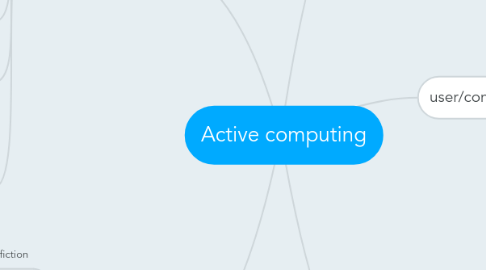
1. social
1.1. for students to connect with support network (friends colleagues support staff faculty family)
1.2. help reduce student and faculty stree
1.3. reduces miscommunications within digital communication
1.4. "can choose music to cheer you up, if it senses you are sad"
1.5. can help people connect who may have difficulties navigating people
2. user/context
2.1. printing areas
2.2. the library
2.2.1. as a resourse for searching information
2.2.2. assistive for studying
2.2.3. for distance education
2.3. projectors
2.4. for distance education/ online courses
2.5. help students use technology they don't know yet for their art or design practice
2.6. for explorative art practices
2.7. could be result in a more inclusive atmosphere for adults with disabilities
3. technologies
3.1. samsung emotion sensing smart phone
3.1.1. interprets inputs like emojis, shaking, speed of typing
3.1.2. potential connection to brain computer interface
3.2. dell's mood sensing computers
3.2.1. "The notion here is that through some sort of device that you put on, by measuring alpha [brain] waves and so forth, you can actually be able to tell your mood for example: whether your happy or sad."
3.3. Machine learning (suggested to potentially combine technologies)
3.4. could function in conjunction with wearables
3.5. apple's "Health"
3.5.1. uses data collected in health to help build emotional profile
3.6. apple watch
3.6.1. contains mood sensing technologies for advertisments, they have what they need through this device to really learn everything about you
3.7. "Dartmouth demonstrated that smartphones can be configured to detect stress, loneliness, depression, and productivity, and to predict G.P.A.s. In September"-newyorker, raffi khatchadourian
4. history
4.1. fiction
4.1.1. the movie "her"
4.1.2. Ma Bell, in 1963 (Jim Henson produced)
4.1.3. star trek
4.2. non fiction
4.2.1. Affectiva
4.2.1.1. formed in 2009
4.2.1.2. Rana el Kaliouby scientist who owns company
4.2.1.3. Rosalind Picard
4.2.1.3.1. professor at the M.I.T. Media Lab
4.3. Paul Ekman
4.3.1. research psychologist
4.3.2. 1960s
4.3.3. "six universal human emotions, expressed by everyone’s face identically, regardless of gender, age, or cultural upbringing"
4.3.3.1. From this work, he compiled the Facial Action Coding System, or FACS—a five-hundred-page taxonomy of facial movements
5. negative impacts
5.1. too high expectations from human computer relationship
5.2. confusion when with non active computing
5.3. inaccessibility
5.3.1. level of understanding
5.3.2. age
5.3.3. social context, familiarity

